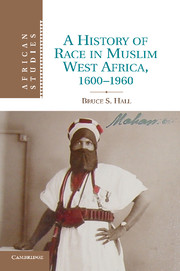Crossref Citations
This Book has been
cited by the following publications. This list is generated based on data provided by Crossref.
BRYANT, KELLY DUKE
2011.
‘THE COLOR OF THE PUPILS’: SCHOOLING AND RACE IN SENEGAL'S CITIES, 1900–10.
The Journal of African History,
Vol. 52,
Issue. 3,
p.
299.
HALL, BRUCE S.
2011.
HOW SLAVES USED ISLAM: THE LETTERS OF ENSLAVED MUSLIM COMMERCIAL AGENTS IN THE NINETEENTH-CENTURY NIGER BEND AND CENTRAL SAHARA.
The Journal of African History,
Vol. 52,
Issue. 3,
p.
279.
Scheele, Judith
2012.
Articulating Islam: Anthropological Approaches to Muslim Worlds.
p.
33.
2012.
Books Received for Review.
Bulletin of the School of Oriental and African Studies,
Vol. 75,
Issue. 1,
p.
217.
Goodman, R. David
2012.
Demystifying “Islamic Slavery”: Using Legal Practices to Reconstruct the End of Slavery in Fes, Morocco.
History in Africa,
Vol. 39,
Issue. ,
p.
143.
GAIBAZZI, PAOLO
2012.
THE RANK EFFECT: POST-EMANCIPATION IMMOBILITY IN A SONINKE VILLAGE.
The Journal of African History,
Vol. 53,
Issue. 2,
p.
215.
O'Rourke, Harmony S.
2012.
Native Foreigners and the Ambiguity of Order and Identity: The Case of African Diasporas and Islamic Law in British Cameroon.
History in Africa,
Vol. 39,
Issue. ,
p.
97.
Lydon, Ghislaine
2012.
African Voices on Slavery and the Slave Trade.
p.
503.
2013.
Autour d'un livre.
Politique africaine,
Vol. N° 131,
Issue. 3,
p.
209.
Hall, Bruce S.
2013.
Arguing sovereignty in Songhay.
Afriques,
SCHEELE, JUDITH
2013.
A pilgrimage to Arawān: Religious legitimacy, status, and ownership in Timbuktu.
American Ethnologist,
Vol. 40,
Issue. 1,
p.
165.
Freire, Francisco
2013.
Castelos a Bombordo.
p.
172.
Triaud, Jean-Louis
2014.
GIVING A NAME TO ISLAM SOUTH OF THE SAHARA: AN ADVENTURE IN TAXONOMY.
The Journal of African History,
Vol. 55,
Issue. 1,
p.
3.
Bergamaschi, Isaline
2014.
The fall of a donor darling: the role of aid in Mali's crisis.
The Journal of Modern African Studies,
Vol. 52,
Issue. 3,
p.
347.
Bullejos, David Nievas
2014.
Islam y Política en Mali.
Cadernos de Estudos Africanos,
p.
13.
Freire, Francisco
2014.
Saharan migrant camel herders: Znāga social status and the global age.
The Journal of Modern African Studies,
Vol. 52,
Issue. 3,
p.
425.
Hunt, Nancy Rose
2014.
THE AFFECTIVE, THE INTELLECTUAL, AND GENDER HISTORY.
The Journal of African History,
Vol. 55,
Issue. 3,
p.
331.
Soares, Benjamin
2014.
THE HISTORIOGRAPHY OF ISLAM IN WEST AFRICA: AN ANTHROPOLOGIST'S VIEW.
The Journal of African History,
Vol. 55,
Issue. 1,
p.
27.
LECOCQ, BAZ
2015.
DISTANT SHORES: A HISTORIOGRAPHIC VIEW ON TRANS-SAHARAN SPACE.
The Journal of African History,
Vol. 56,
Issue. 1,
p.
23.
Lienau, Annette Damayanti
2015.
Reframing Vernacular Culture on Arabic Fault Lines: Bamba, Senghor, and Sembene's Translingual Legacies in French West Africa.
PMLA/Publications of the Modern Language Association of America,
Vol. 130,
Issue. 2,
p.
419.



